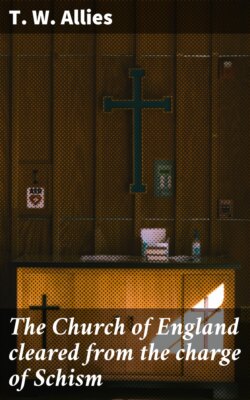The Church of England cleared from the charge of Schism

Реклама. ООО «ЛитРес», ИНН: 7719571260.
Оглавление
T. W. Allies. The Church of England cleared from the charge of Schism
The Church of England cleared from the charge of Schism
Table of Contents
TESTIMONIES OF COUNCILS
FATHERS OF THE FIRST SIX CENTURIES
THOMAS WILLIAM ALLIES, M. A
LONDON: JAMES BURNS, 17, PORTMAN STREET,
1846
LONDON: R. CLAY, PRINTER, BREAD STREET HILL
ADVERTISEMENT
THE CHURCH OF ENGLAND CLEARED FROM. THE CHARGE OF SCHISM
R. CLAY, PRINTER, BREAD STREET HILL
Footnote
Отрывок из книги
T. W. Allies
Upon Testimonies of Councils and Fathers of the first six centuries
.....
that he, who fighting her battles, never met with his equal, unsubdued by any foe from without, has surrendered to his own doubts and fears; self-conquered, has laid down her arms, and has gone over to the camp opposed. Henceforth she has ranged against her those powers of genius and that sanctity of life, to which so many of her children looked as to a certain omen of her Catholicity. They felt that she who bore such children, must needs be the spouse of God. It is no wonder that many others, of no mean name among us, and whom we could ill afford to spare, have had their doubts and disquietudes determined by such a fact as this. For the first time, I repeat, in the history of the Church of England have earnest and zealous children of hers, who desired nothing but their own salvation and the salvation of others, found no rest for the sole of their feet within her communion. Men who set out with the most single-minded purpose of defending her cause, nay, of winning back to her bosom alienated multitudes, of building her up in a beauty and a glory which she has not yet seen, and one, especially, who has been the soul of that great movement to restore her,—these have now, after years of hard fighting spent in her service, quitted her, and proclaim that all who value their salvation must quit her likewise.
These are some of the special circumstances which force upon the most reluctant the question of Schism. It was the privilege of other days to feed in the quiet pastures of truth. We have to seek the path to Heaven through the wilderness of controversy, where too often "the highways are unoccupied, and the travellers walk through byways." But it is a question which cannot be put off or thrust aside. No instructed Christian, who has any true faith or love, can bear the thought that he is out of the one fold of Christ. The question cannot be put off, for it will brood upon him in his daily devotions and labours; a doubt as to the justice of his cause will paralyse all his exertions. It cannot be thrust aside; for the imputation of heresy on another has no tendency to answer the charge of schism against oneself. It must be met openly, honestly, and without shrinking. The charge of Schism touches immediately the Christian's conscience, for this reason, that, if true, it takes away from his prayers, his motives, his actions, his sufferings, that one quality which is acceptable to Almighty God. Here it is most true, that "all, which is not of faith, is sin:" he who does not believe, at least, that he is a member of the one Church, whatever outward acts he may perform, cannot please his Judge. In the words of one who himself gave his goods to feed the poor, and shed his blood for the testimony of Jesus,[3] "if such men were even killed for confession of the Christian name, not even by their blood is this stain washed out. Inexpiable and heavy is the sin of discord, and is purged by no suffering. He cannot be a martyr who is not in the Church; he can never attain to the kingdom, who leaves her with whom the kingdom shall be." "A man of such sort may indeed be killed, crowned he cannot be." Therefore the charge of Schism, when once brought before the reflecting mind, cannot be turned aside,—it must be met and answered: if it is not answered, at least to the conviction of the individual, it leaves upon the whole of his obedience the stain of insincerity, which is fatal. In this respect it is more pressing and imperious, more fatal, even than that of heresy. I observe this, because, in the comments I have seen on the painful departures of friends from among us, and in exhortations not to follow them, it has not seemed to be always recognised. When men leave us on the ground that we are in schism, surely all censure of them, and all defence of ourselves, is beside the mark, which does not meet and rebut this particular accusation. Under this no man can rest: it is useless, it is sinful, to ask him to rest, unless you can remove the imputation. To talk of "disappointment, or a morbid desire of distinction, or impatience under deficiencies, want of discipline, or sympathy in spiritual superiors," and such-like causes, as being those which have impelled a man to the most painful sacrifices, and "in the middle of his days to begin life again," is surely both untrue as regards the individual, and futile as to preventing others doing like him, when the ground of schism among others is alleged by himself, and is felt to lie at the bottom. Could we prove that the Church of England is clear both of enunciating heresy in her formularies, and of allowing it within her pale, it would in no respect answer this charge of schism against her, except so far as the à priori presumption, that she who is clear of the one would be clear of the other also. But it would remain to be met and answered specifically.
.....